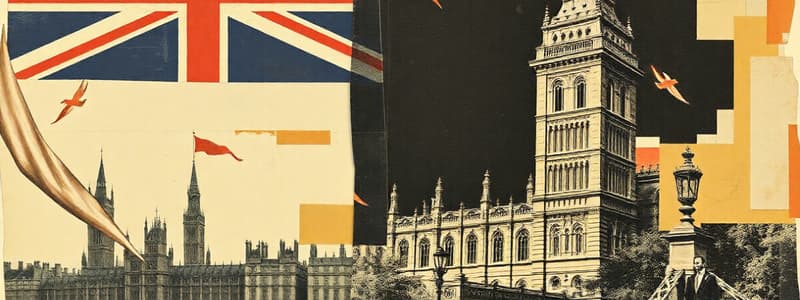Podcast
Questions and Answers
What is a key characteristic of the British constitution?
What is a key characteristic of the British constitution?
- Written
- Flexible (correct)
- Rigid
- Federal
Which entity is formally recognized as the head of state?
Which entity is formally recognized as the head of state?
- Lord Chancellor
- Monarch (correct)
- Parliament
- Prime Minister
Which of the following is NOT considered a component of the state in the context of the constitution?
Which of the following is NOT considered a component of the state in the context of the constitution?
- Citizens
- Media (correct)
- Parliament
- Government
What is one of the functions of the government as outlined in the context of the constitution?
What is one of the functions of the government as outlined in the context of the constitution?
Which of the following best describes the nature of the British constitution?
Which of the following best describes the nature of the British constitution?
What is one of the main functions of the House of Commons?
What is one of the main functions of the House of Commons?
Which entity is responsible for interpreting legislation?
Which entity is responsible for interpreting legislation?
What is a key feature of the rule of law?
What is a key feature of the rule of law?
Which of the following is a function of the House of Lords?
Which of the following is a function of the House of Lords?
Who is the head of the judiciary?
Who is the head of the judiciary?
What does the House of Commons do regarding individual ministers?
What does the House of Commons do regarding individual ministers?
Which group among citizens enjoys fundamental rights and freedoms?
Which group among citizens enjoys fundamental rights and freedoms?
Which of the following describes constitutional law based on natural law?
Which of the following describes constitutional law based on natural law?
Flashcards
The Law of the Constitution
The Law of the Constitution
The fundamental law of a state, setting out the structure and functions of its institutions and the relationship between the state and individuals.
The Monarch
The Monarch
A monarch is the formal head of state, representing the country and its symbols. The monarch's role is ceremonial and symbolic.
The Government
The Government
The government is the executive branch responsible for formulating and enacting policies. It includes the Prime Minister, cabinet, departments, and civil servants.
Parliament
Parliament
Signup and view all the flashcards
The Courts
The Courts
Signup and view all the flashcards
What is Parliament?
What is Parliament?
Signup and view all the flashcards
What is the House of Commons?
What is the House of Commons?
Signup and view all the flashcards
What is the role of the House of Lords?
What is the role of the House of Lords?
Signup and view all the flashcards
What is the Judiciary?
What is the Judiciary?
Signup and view all the flashcards
What is the rule of law?
What is the rule of law?
Signup and view all the flashcards
What are constitutional doctrines?
What are constitutional doctrines?
Signup and view all the flashcards
What are civic/constitutional duties?
What are civic/constitutional duties?
Signup and view all the flashcards
What are civic/constitutional rights?
What are civic/constitutional rights?
Signup and view all the flashcards
Study Notes
Public Law
- Public law is the most important legislation in a state, outlining the structure and functions of state institutions.
- It typically defines the relationship between the state and individual citizens.
- The British constitution is an example of an unwritten one (though often referred to as being written).
- Key characteristics of the British constitution include being unwritten, monarchical, flexible, and unitary.
What Comprises the State?
- The state is comprised of the monarch, government (executive), and parliament (legislative).
The Monarch
- The monarch acts as the formal head of state, in addition to being the head of devolved governments, armed forces, and the Church of England.
- The monarch is immune from prosecution and is subject to democratic accountability.
The Government
- The government is headed by the Prime Minister.
- It includes the Cabinet and various government departments.
- Civil servants (politically impartial) within the government support policy formulation, initiate and introduce legislation to parliament.
Parliament
- Parliament is comprised of the Crown, House of Commons, and House of Lords..
- Key functions include making legislation, debate, and oversight of government actions.
House of Commons
- Scrutinizes government actions.
- Holds the government and individual ministers accountable.
- Allows members of parliament to represent their constituents.
- Responsible for making laws.
House of Lords
- Debates legislation proposed by the House of Commons.
- Oversees the government.
The Judiciary
- The Judiciary comprises the courts, with the Lord Chief Justice as head.
- Other key figures include the Lord Chancellor and Attorney General.
- They interpret legislation and make law.
- They also provide checks against both Parliament and the executive.
Citizens
- Citizens have civic and constitutional duties and rights.
- They enjoy fundamental rights and freedoms.
The Rule of Law
- The rule of law is a key principle in the British constitution.
- It embodies the supremacy of laws, avoiding arbitrary power, and ensuring equality before the law.
- Constitutional law is rooted in natural law principles and provides unwritten but important guidelines for state actions.
Studying That Suits You
Use AI to generate personalized quizzes and flashcards to suit your learning preferences.




